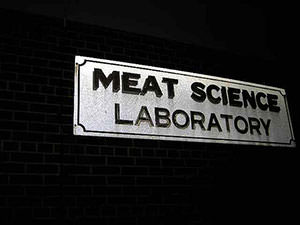Lab-Grown Meat Is Real, but Will People Eat It?
Right now the U.S. Census Bureau estimates the world population at 7 billion and growing. Feeding all those people is going to be a challenge and, like it or not, it may involve really disgusting meat jelly.
Right now the U.S. Census Bureau estimates the world population at 7 billion and growing. Feeding all those people is going to be a challenge and, like it or not, it may involve really disgusting meat jelly.
Here’s a brief rundown of our problems. Growing vegetables takes a lot of water, and we have a looming fresh water crisis. In fact, you can more or less trace a direct line from drought to low crop yields to the high cost of food and civil unrest in the Middle East and elsewhere.
“Growing” meat, as in cows, takes a lot of vegetables and a lot of water, and that’s not really an option for feeding 9ish billion people (which we may have before mid-century).
We’ve already fished the oceans nearly to depletion, and fish farming has met with all sorts of complications.
So scientists, faced with the challenge of feeding the world, are working on ways to grow protein in the lab. They say they’re actually close, but the problem is trying to produce something, well, palatable.
The Observer:
The truth, though, is that artificial steak is still a way off. Pizza toppings are closer. The star of the Dutch research into in-vitro meat, Dr Mark Post, promised that the first artificial hamburger, made from 10bn lab-grown cells, would be ready for “flame-grilling by Heston Blumenthal” by the end of 2012. At the time of writing it is still on the back burner. Post (who previously produced valves for heart surgery) and other Dutch scientists are currently working over the problem of how to turn the “meat” from pieces of jelly into something acceptably structured: an old-fashioned muscle. Electric shocks may be the answer.
This quest is key to the future of food. It’s not what can be done but what we will accept. Some scientists warn that trying to copy the meats humans are used to is futile – another symptom of our ignorant and unsustainable nostalgia about food. “It’s simplistic to say ‘natural is good’, to reject globalisation and hark back to a mythical past when food was still ‘true and honest’,” says the Dutch intellectual Louise Fresco, a former head of food- innovation research and an advisor to the UN.
Ultimately, we may not have a choice about what we eat. We’ve been there before. How do you think the world ended up with culinary delights like blood sausage?
— Posted by Peter Z. Scheer. Follow him on Twitter: @peesch.
Your support is crucial…With an uncertain future and a new administration casting doubt on press freedoms, the danger is clear: The truth is at risk.
Now is the time to give. Your tax-deductible support allows us to dig deeper, delivering fearless investigative reporting and analysis that exposes what’s really happening — without compromise.
Stand with our courageous journalists. Donate today to protect a free press, uphold democracy and unearth untold stories.









You need to be a supporter to comment.
There are currently no responses to this article.
Be the first to respond.